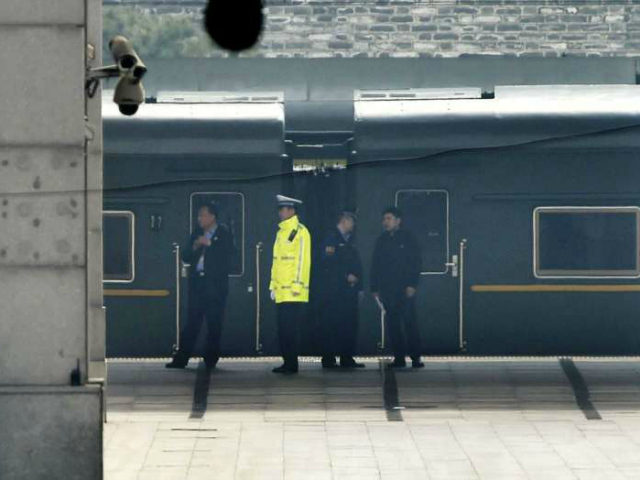Neither the governments of China nor North Korea has confirmed persistent rumors that dictator Kim Jong-un traveled via train to Beijing on Monday. On Tuesday, following the departure of a mysterious North Korean train from the Chinese capital, Chinese Foreign Ministry spokeswoman Hua Chunying told reporters she had “no idea” whether such a visit occurred.
Hua addressed reporters at her regular ministry briefing Tuesday and insisted she had no information on the rumors, according to CNN.
Speculation that Kim had made a secret visit to President Xi Jinping on Monday spread rapidly as Japanese news outlets began publishing photos of a mysterious antiquated green train traveling out of North Korea towards the Chinese capital. The train appeared similar to one used by late dictator Kim Jong-il for trips to China and was accompanied by heightened security in the capital.
Outlets such as Bloomberg and Japan’s NHK cited anonymous sources who claimed to know that Kim Jong-un was the official visiting. Most outlets have noted that, in past similar situations, neither government has revealed the visit until after the North Korean dignitary safely returned home.
Kim Jong-un has not left North Korea ever in his capacity as head of state.
Aside from Hua’s remark, neither government has made any public statement confirming or denying the visit.
In China, Beijing residents questioned the extreme security surrounding the city on Monday. Eyewitnesses told the South China Morning Post on Monday that security in Beijing was “even higher” than during the two sessions of the National People’s Congress last month, in which the legislature repealed term limits on dictator Xi Jinping and enshrined his name in the country’s Constitution.
By Tuesday afternoon, however, security had wound down to normal levels at the Beijing railway station.
The Post notes that more evidence surfaced that a high-level meeting with North Korean officials occurred online, where “searches for ‘North Korea’ in Chinese on Weibo, China’s equivalent to Twitter, were returned with a message saying ‘no results were found’ on Tuesday morning.”
Chinese Internet censors also deleted social media posts discussing the North Korean train and banned the word “fatty” from searches on social media. Chinese Internet users often disparagingly refer to Kim as “Fatty the Third.”
The government of South Korea, as of Tuesday, remains uninformed of the details of the train’s visit to Beijing. An unidentified South Korean official told that nation’s news agency, Yonhap, that Seoul is still trying to “thoroughly grasp the related situation, including whether the reports are true.” They have failed to verify whether the rumors are true, the source said.
Multiple officials who spoke to Yonhap indicated that there was an equal chance of the train carrying Kim Jong-un or any number of other high-ranking North Korean officials. “There is not enough circumstantial evidence to indicate that Kim Jong-un is visiting China … although the possibility cannot be ruled out,” another source said.
The potential visit follows an eventful month of North Korean diplomacy in which Kim allegedly invited American President Donald Trump to an in-person meeting, one that Trump has accepted. The White House claimed this month that the Kim-Trump summit will occur by May, though the U.S. State Department confirmed last week that they have received no communications from North Korea on organizing the meeting. Instead, North Korean officials have agreed to a meeting with their South Korean counterparts on Wednesday, believed to be meant for organizing the logistics of a meeting between Kim Jong-un and South Korean President Moon Jae-in by April. Kim extended the invitation to Trump through South Korean envoys.
Following the announcement of a planned Trump-Kim summit, Chinese state media began publishing a series of stories insisting that South Korea’s diplomatic success in delivering the message had not “sidelined” China from denuclearization talks with Pyongyang.
“China’s efforts worked,” the Global Times argued in an editorial in early March, asserting that China had not been “marginalized.”
“China will welcome the dialogue between the U.S. and North Korea, and resolutely support North Korea securing its due interests in the process of denuclearization. Through these efforts, China’s interests will not be pushed aside,” the newspaper argued.
In a later editorial defending its role in U.S.-North Korea diplomacy, the Global Times quoted a communist “expert” who insisted:
The U.S. and South Korea have praised China for pushing the positive change in the situation, and this shows that these two countries, which used to blame China for “not doing enough to stop North Korea” and refused China’s proposals, have finally understood China’s efforts and accepted China’s suggestion.
China is North Korea’s largest trading partner and responsible for keeping much of its economy afloat.
Despite all the media surrounding the Trump-Kim summit, it is not yet clear whether it will occur. A report in South Korea’s Chosun Ilbo this week, citing sources in Seoul, states that North Korea is “highly suspicious” of Washington and dismayed that Trump has not lifted any sanctions on North Korea in gratitude for having accepted a theoretical meeting. Pyongyang was “particularly surprised to see the U.S. maintain maximum pressure even after accepting the summit offer,” one source said.

COMMENTS
Please let us know if you're having issues with commenting.